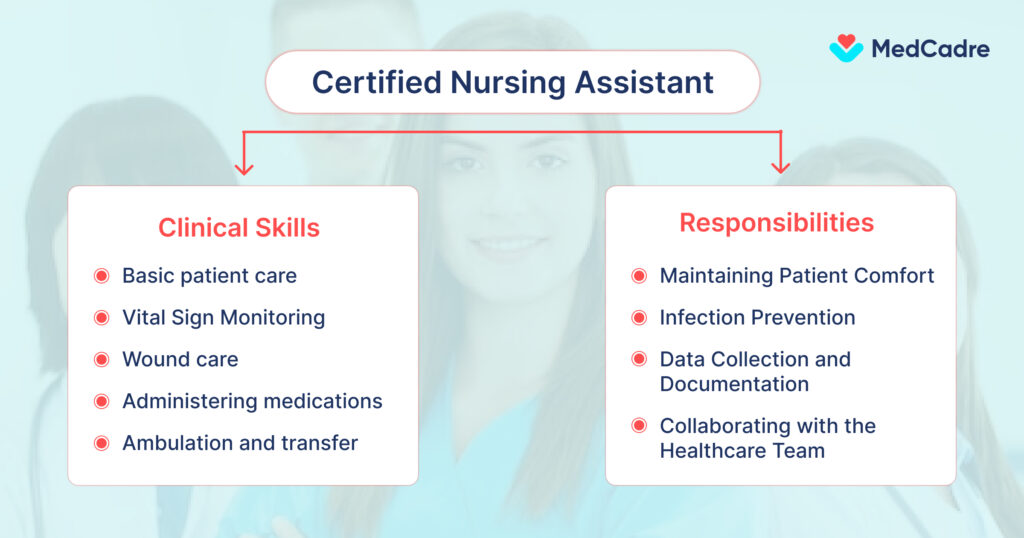CNAs or Certified Nursing Assistants play a major role in the healthcare system, they provide care directly to patient so they can heal soon. Their medical expertise and enthusiasm are foundational to a pleasant and supportive patient experience. But do you know? What does the CNA do? If not! We are here with the top clinical skills and responsibilities of CNA that help you to learn about the job in deep. Let’s get started.
Clinical skills and responsibilities of CNA

Clinical skills requirement needed to become a CNA
- Basic patient care is one of the major clinical skills of a CNA. This includes assistance with activities of daily living (ADLs) such as bathing, dressing, eating, and toileting. CNAs must know appropriate infection prevention techniques and practices to ensure patient safety and comfort.
- Taking and recording vital signs such as temperature, heart rate, respiration, and blood pressure are important to determine the patient’s condition and identify potential health issues.
- CNAs help with wound care, they clean the wound, and bandage if required.
- CNAs may administer oral, topical, and transdermal medications under the supervision of a registered nurse. Accurate dosing is ensured and records are kept.
- Patients need effective physical strength, endurance, and coordination to walk, use a wheelchair, and move safely between beds, chairs, and other objects.
Responsibilities of CNA
- CNAs play an important role in providing a positive, supportive environment for patients and it is one of the major responsibilities of CNAs. This includes responding to emergency light calls, dealing with concerns, and providing emotional support.
- Responsibilities of CNAs is to follow strict hygiene practices to prevent the spread of disease. This includes hand washing, proper use of personal protective equipment (PPE), and keeping the environment clean and free of bacteria.
- Documentation of vital signs, controls and exclusions, and other observations is essential for informed patient care decisions. CNAs must maintain accurate and timely documentation.
- CNAs collaborate with nurses, physicians, and other healthcare professionals to provide comprehensive care. They effectively communicate patient diagnoses, concerns and progress updates.
Also read: Adjusting To New Work Environments As A Travel CNA
Beyond the technical skills, the other responsibilities of a CNA need to have these skills too:
- Building relationships with patients, families, and colleagues is essential for effective communication and collaboration.
- Understanding and meeting patients’ emotional needs is critical to providing comprehensive care.
- Identifying potential issues and adapting to changing circumstances is essential for effective patient care.
- Working closely with other healthcare professionals is essential to achieving the best outcomes for patients.
- CNAs must respect the culture and beliefs of their patients.
Future outlook of CNA
The future outlook for Certified Nursing Assistants (CNAs) looks good, with continued job growth and high demand predicted. Here is a breakdown of some of the highlights:
Career development
- U.S. The Bureau of Labor Statistics (BLS) projects a 4% increase in employment for CNAs from 2022 to 2032, almost as fast as the average for all industries This results in approximately 209,400 new job openings per year.
- Some data suggest an even increase, with the American Association of Colleges of Nursing estimating an 8% increase by 2030.
Requirements drive future growth
- The aging population is a key driver of CNA demand. As baby boomers reach retirement age, they will require more long-term care, including assistance with activities of daily living.
- The increasing popularity of home care also creates opportunities for CNAs. This trend is driven by factors such as rising healthcare costs and the desire of older adults to remain as independent as possible.
Other features to be considered
- Advances in technology can affect the nature of a CNA’s work, requiring flexibility and possibly new skills. However, the technology is expected to improve the efficiency of the CNA and create new opportunities in areas such as data analytics and telehealth.
- More patient-centered care may lead to greater demand for CNAs with strong communication and interpersonal skills.
- Salaries for CNAs will remain competitive, potentially increasing as demand increases.
The future looks promising for CNA. If you are considering this career path, here are some things to keep in mind:
- Research job overviews and salary lists specific to your job.
- Choose a reputable training program and get your certification.
- Stay updated on industry news and developments.
- Have strong communication and interpersonal skills.
- Consider specializing in a specific area such as home care or geriatrics.
What’s next
Once you learn the clinical skills and requirements to become a CNA, now it’s time to apply for the job, here MedCadre comes in. MedCadre CNA staffing agency is the top nursing staffing agency in the United States, with more than 5000 career opportunities published on our website. If you want to become a Certified Nursing Assistant (CNA), we will walk you through the process.
Follow these steps to have an easy experience:
- Go to www.medcadre.com and select “Job Seekers” followed by “Current Openings.”
- In the “Current Openings” section, use the search box to enter keywords such as “CNA” or “Certified Nursing Assistant”. Alternatively, provide the desired location.
- To know the requirements and everything about the job click the apply now right side in the job list.
- Once you have read the complete requirements and you find the job as per your requirements you can apply for that job through the “Apply Now” button on the bottom of the job post.
- Fill out the job application form and upload your CV.
- To finish your application, click the “Submit” button.
Conclusion
Certified Nursing Assistants (CNAs) play a crucial role in patient care, blending clinical expertise with compassionate responsibilities. Their diverse skill set, from basic patient care to documentation and collaboration, ensures quality healthcare delivery. With a promising future outlook driven by factors like an aging population and technological advancements, aspiring CNAs should prioritize research, training, and partnering with reputable staffing agencies like MedCadre to kickstart their career journey. Overall, CNAs make a significant impact in healthcare, providing essential support and comfort to patients in need.


